Why do we need all generations to learn how young people think and how to connect with them? We need a bigger group of people to train up the young. Like the African proverb says: "It takes a village to raise a child". An entire community of people must interact with children for them to experience and grow in a safe and healthy environment.
This is just the same for raising children and youth to become disciples of Jesus. We cannot leave it to the parents alone or to the youth leader. We need all and everyone to help.
With this article I want to give a voice to the younger generation and cry out to all Committed Christians! It is urgent, and you are needed!
When we dive into the results of the Global Youth Culture Study we undertook at Onehope during 2019 and 2020, it is clear that we are dealing with a group of people who are open-minded yet confused, who can be found in their schools with their peers , but who also spend many hours a day on their phones. We found out about their struggles, their beliefs, their relationships, their connectedness and who and what influences them. We heard of their longing for authentic relationships and experiences. And we saw a significant and positive difference in those who identified as ‘committed Christians’; those who are disciples.
It is of the highest importance that we study Youth Culture. I keep thinking of that part of Paul’s letter to the Corinthians when he says that he became a Jew to the Jews, and a Greek to the Greeks, and all of this for the sake of the gospel, that I may share in its blessings. So if you want to reach youth, you must study them so you can find ways to connect. All for the sake of the Gospel: to make disciples!
Each new generation is unique in its own way and research can help us understand how the world looks through different eyes. The world’s current generation of teens and young adults is sometimes called Generation Z.
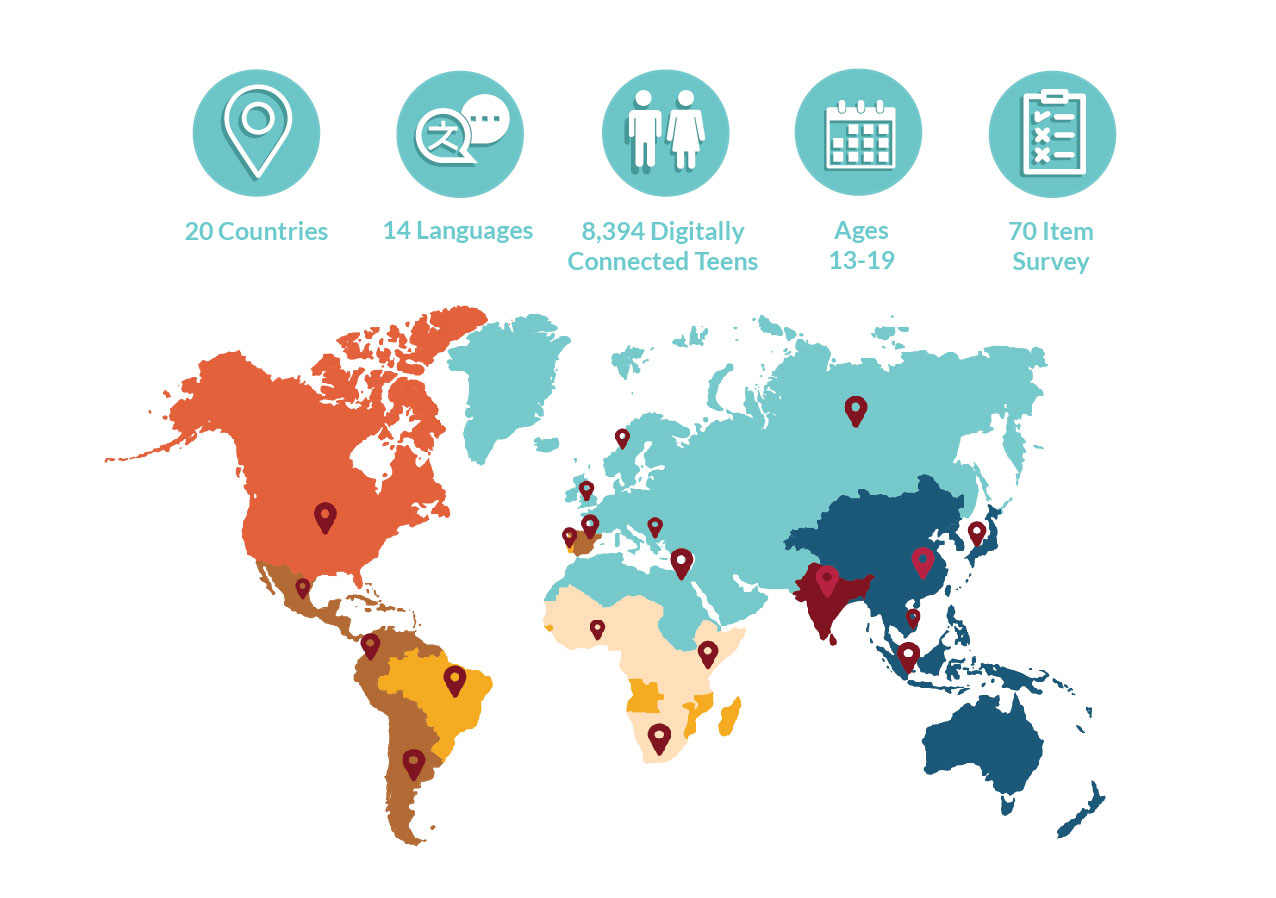
The data is part of a larger global study that surveyed teens across 20 countries. We believe this study is the most comprehensive of its kind in terms of taking an in-depth look at the faith of this generation. The thousands of data points we collected create a picture of this global generation including the values they share, the struggles they face, and what teens are looking to when seeking for answers and hope. In Western Europe we interviewed 800 young people in the UK and in The Netherlands.
1. RELIGIOUS ATTITUDES AND BEHAVIOURS
So what is the difference between the groups in their thinking and behavior? This research shows a huge difference in thinking and behavior of GenZ when they see themselves as Committed Christians.
Saying you are a Christian and being serious about living out your faith can be two different things. We looked at the core beliefs and key spiritual disciplines that would reveal a teen is a Committed Christian.
One in four Christian young people said children's ministry was important (to them) but half said they didn't actually participate.
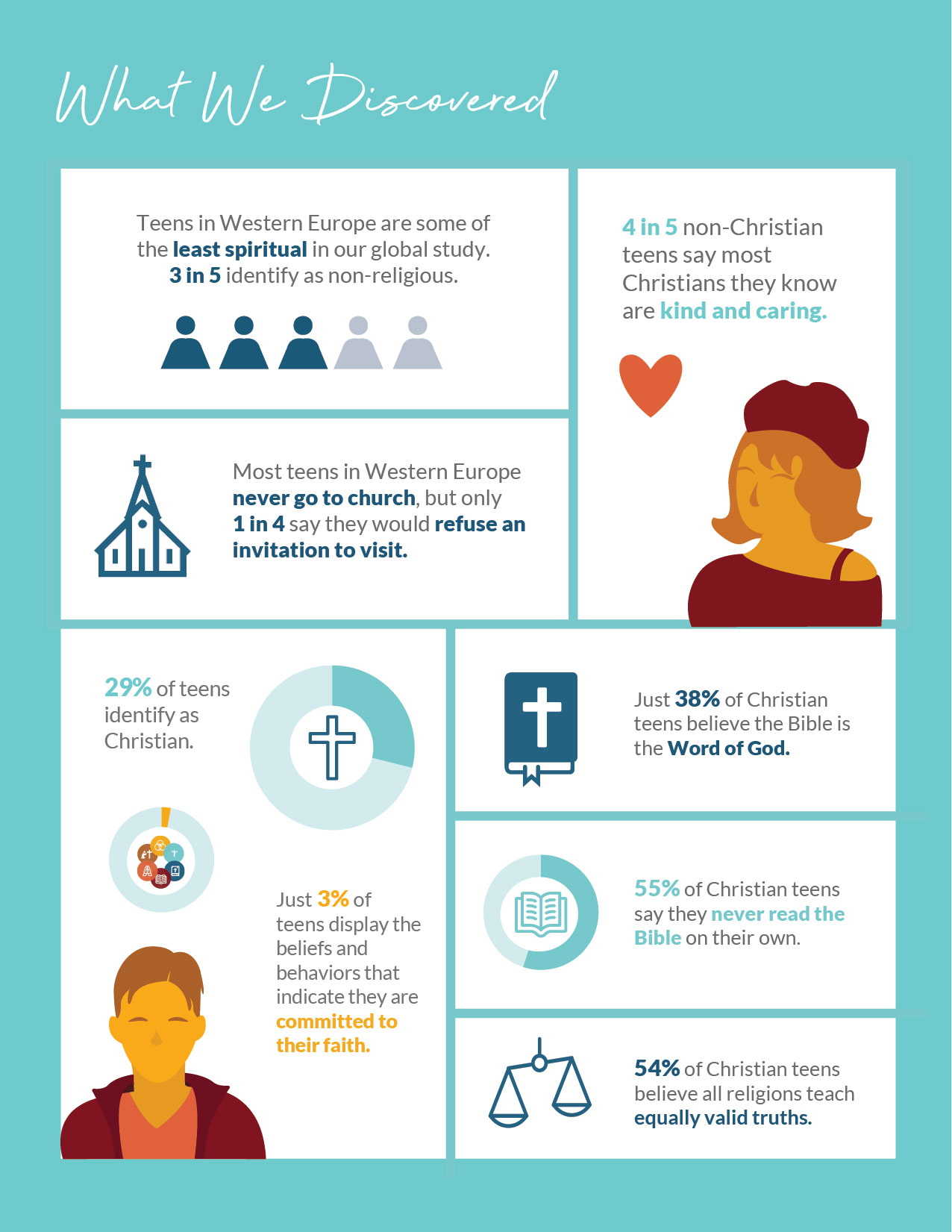
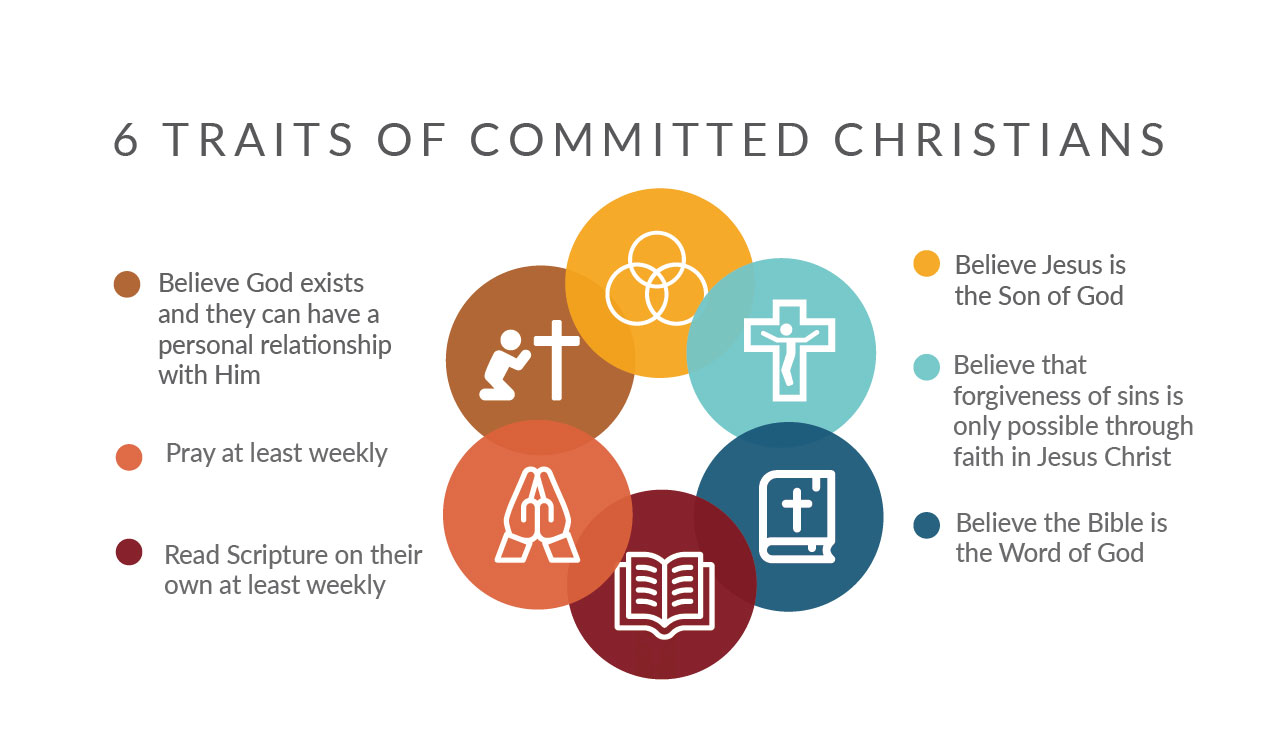
Conclusions from the full report
Today’s young people are not hostile towards Christianity; they just aren’t thinking about matters of faith. In fact, non-Christian teens have a positive perception of the Christians they know giving us an open door for sharing with them. How can we start conversations with this non-religious generation that awakens them to the spiritual things they are missing out on?
Let’s disciple teens to grow and read
Our research revealed very few committed Christians in the Netherlands and the UK. How can we help teens mature in their beliefs and spiritual disciplines in order to experience the life transformation the Gospel holds for them?
Teens need the truth of God’s Word in their lives, but more than half of Christian teens say they never read the Bible. How can we help this next generation encounter the life-giving truth God’s Word has for them and develop a hunger for Scripture in their lives?
Let’s strengthen church and youth ministry
Teens in Europe have a positive perception of the Christians in their lives. Even though the vast majority never attend church, most say they would consider coming if invited. So it doesn’t hurt to ask!
Many Christian teens report that they did not attend a children’s ministry and that their current church does not have a youth pastor. Yet the data revealed that 11 is the pivotal age of commitment for most Christian teens. How can we ensure this generation is being well cared for spiritually within our churches so their faith can become strong and mature?
2. PERSONAL EXPERIENCES AND STRUGGLES
A large number of teens are reporting loneliness, high anxiety, or depression, especially in the UK which ranks among the highest countries globally for these issues. How can we come alongside young people and encourage them in the midst of the challenges they are experiencing? 29% of teens in Europe have tempted by suicidal thoughts and 4% have attempted suicide at some point". How can we help young people see the light and embrace the hope of the Gospel for their lives?
Committed Christians struggle less
It is good news that teens who are taking their faith seriously are also experiencing less struggle. How can we help teens commit to the core beliefs of Christianity as well as to the spiritual disciplines of prayer and Scripture engagement that are seen to make such a big difference in their lives?
Girls need additional support
Girls are struggling more than boys with their mental health and we cannot ignore this. Consider the unique struggles girls may be facing and how we can empower mature women of faith to disciple this next generation.
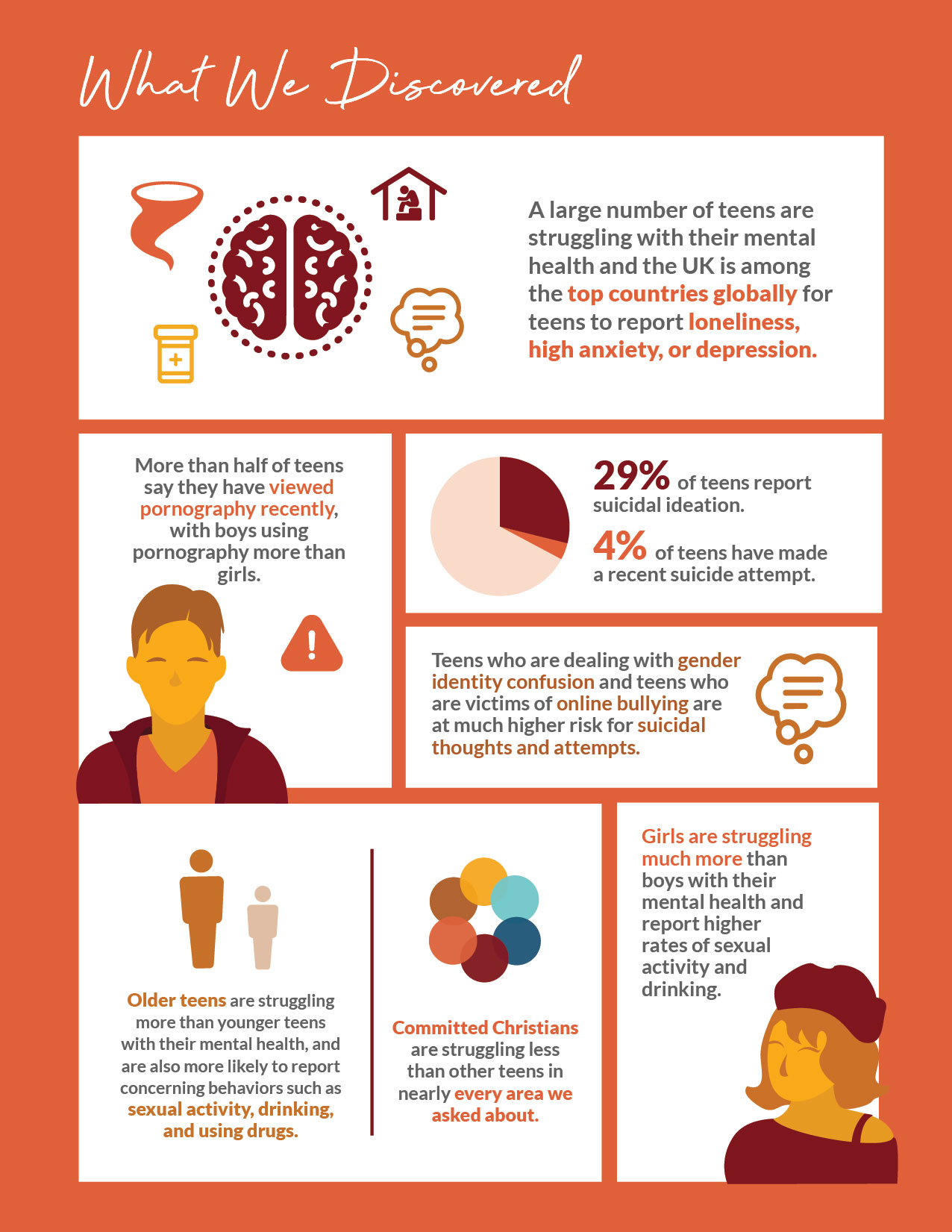
This is a significant issue for today’s teens in Europe and around the world. Neither age nor faith protect a teen from sexual feelings and urges. And those urges can be so easily met thanks to the easy access the Internet provides. How can we address the pervasive issue of pornography usage that has ensnared this next generation?
3. DIGITAL CONNECTEDNESS AND IMPACT
They spend a lot of their online time chatting and talking. How can we empower them to have meaningful, thought-provoking conversations with their peers? In addition, how can we as the church engage in meaningful, thought provoking conversations with teens on these chatting platforms?
Videos are very popular
Videos are part of every teen’s daily life – 97% say they watch video content every day - and they can be a powerful vehicle to reach young people. Teens are constantly returning to platforms like YouTube and Netflix. How can we use this appealing medium to reach young people for Christ?
Social media generates mixed responses
Teens check their social media feeds every day, but most don’t spend a lot of time on these platforms. Teens are also divided on whether or not social media is helping or hurting them, with girls more negatively affected than boys. Consider the content you are putting out for them and how you can help them navigate their complex relationship with their digital devices.
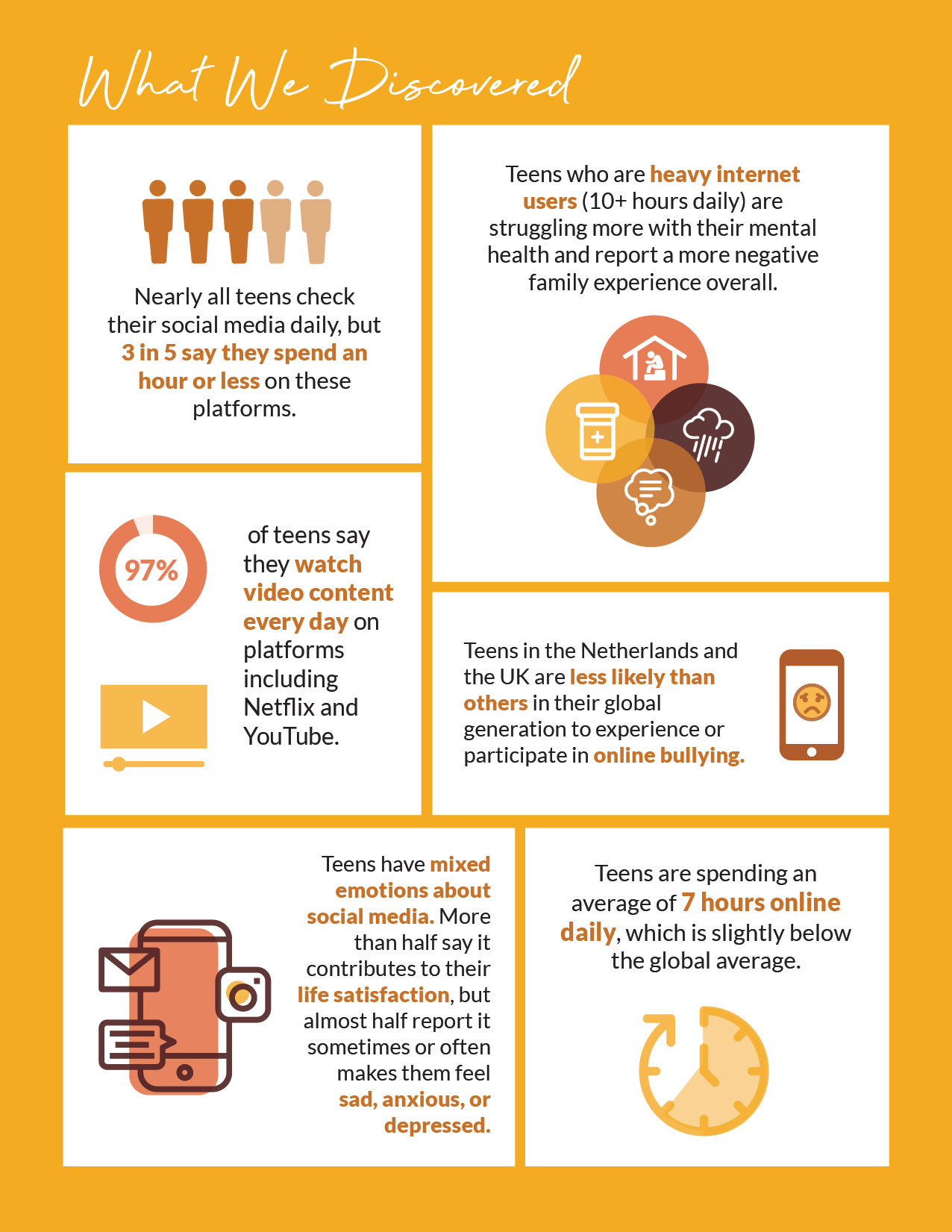
While we can’t say technology is causing these problems, it is clear that those who are spending a lot of time online may be dealing with some serious mental health issues. How can we come alongside young people and encourage them towards a healthy outlook in the midst of the circumstances they face?
4. IDENTITY AND RELATIONSHIPS
Around half of today’s teens believe gender is determined by sex at birth, while the other half say gender is something that can be self-determined according to one’s personal feelings or sexual desires. How can we engage teens in holistic conversation about this topic and the implications of these important life choices?
Same-sex attraction is a significant issue for this generation
Teens in Western Europe are some of the most likely in the world to be having these feelings. In addition, teens who are experiencing this may also be dealing with gender identity confusion, high anxiety, or loneliness. How can we create safe spaces for teens to share what they are going through and be able to encounter what the Bible has to say about this multifaceted and complex area of their life?
The conversation around gender and sexuality is confusing
Teens are divided on where to turn for guidance on these topics and the voice of culture is loud. How can we ensure teens have wise counsel and trusted people in their lives to safely discuss their personal experiences and questions in this area?
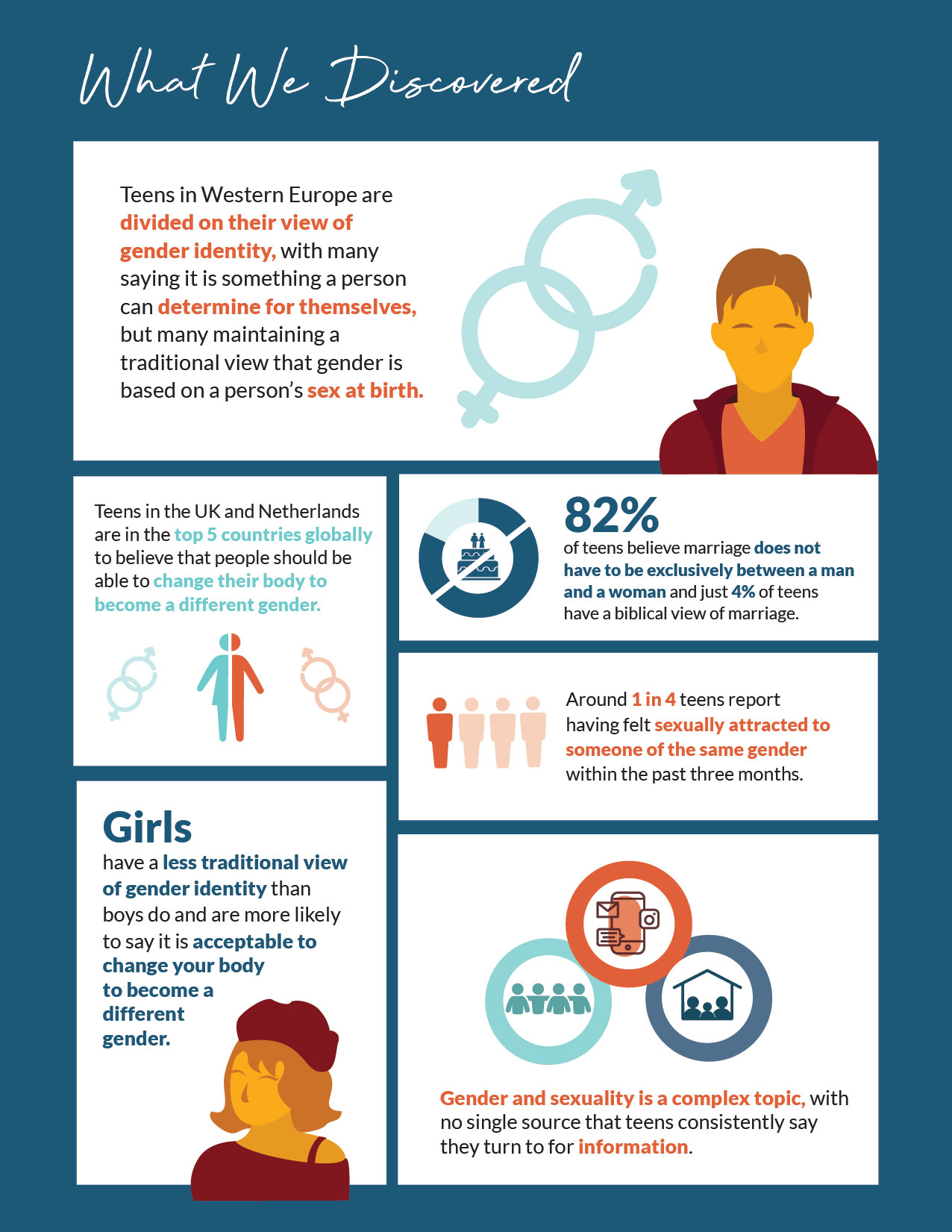
They are much more likely than boys to report same-sex attraction and have a more flexible view of gender and marriage as well. How can we be intentional in providing healthy support for girls that guides them to reflect more deeply on what God has to say about these topics?
Teens in Western Europe say a strong no to marriage as exclusive between a man and a woman, and teens in the Netherlands specifically are unsure if marriage should be a lifelong commitment. How can we help teens understand God’s plan for marriage and the benefits of commitment when it comes to covenant?
Christians need discipleship in the area of sexuality
In Eastern Europe the beliefs and behaviours of Christian teens and youth are not that different from non-Christians when it comes to sex before marriage. How can we guide young people to a more biblical lifestyle that values and stewards the gift of sexuality?
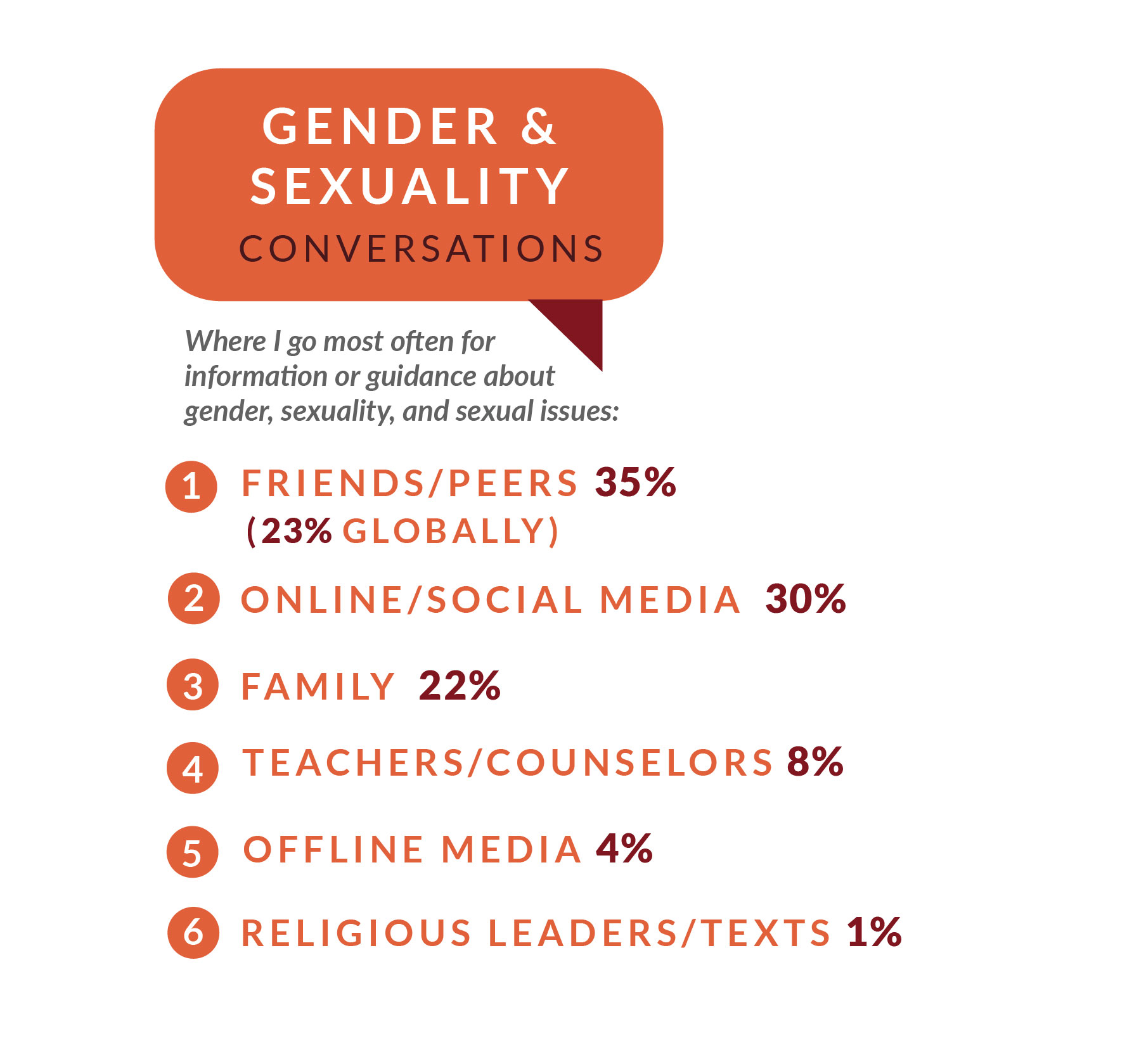
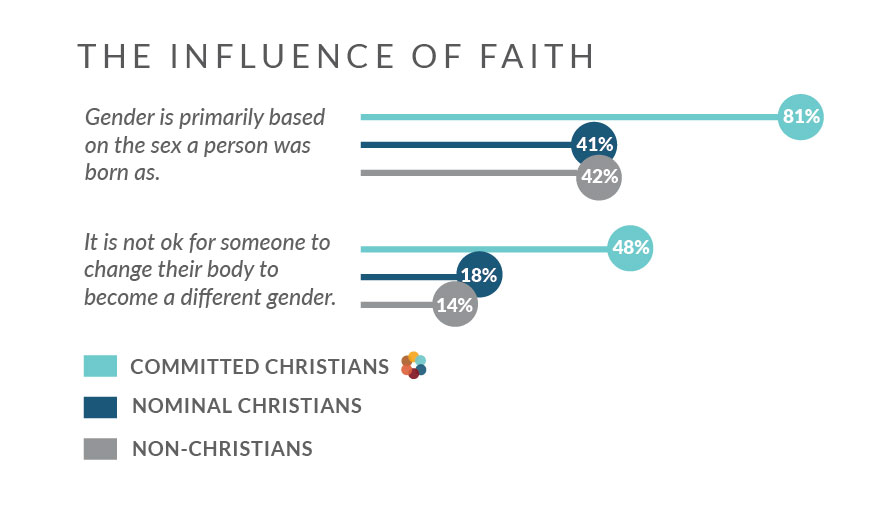
5. INFLUENCES AND GUIDING VOICES
Encouragingly, teens and youth report a positive family experience and parents are the first ones they go to for some of life’s most important questions. But when the family environment is not positive, teens instead speak to their peers or go online for guidance. How can we help parents become aware of the influence they have and strengthen families to disciple this generation within the home?
Scripture and the church’s teachings are not a primary influence
Even for most Christian teens and youth, God’s Word is not the first place they go for counsel. How can we create safe spaces for them to wrestle with life’s hard questions and engage the Bible as a trusted guide?
Youth want to engage faith with both their head and their heart
This generation needs logical reasons to change their mind about religious beliefs, but is also hungry for authentic personal experiences of faith. How can we create opportunities for them to have personal experiences of faith, especially in digital spaces where teens spend so much time?
The Global, Eurasia and Western & Eastern Europe reports are available and free to download on our website.
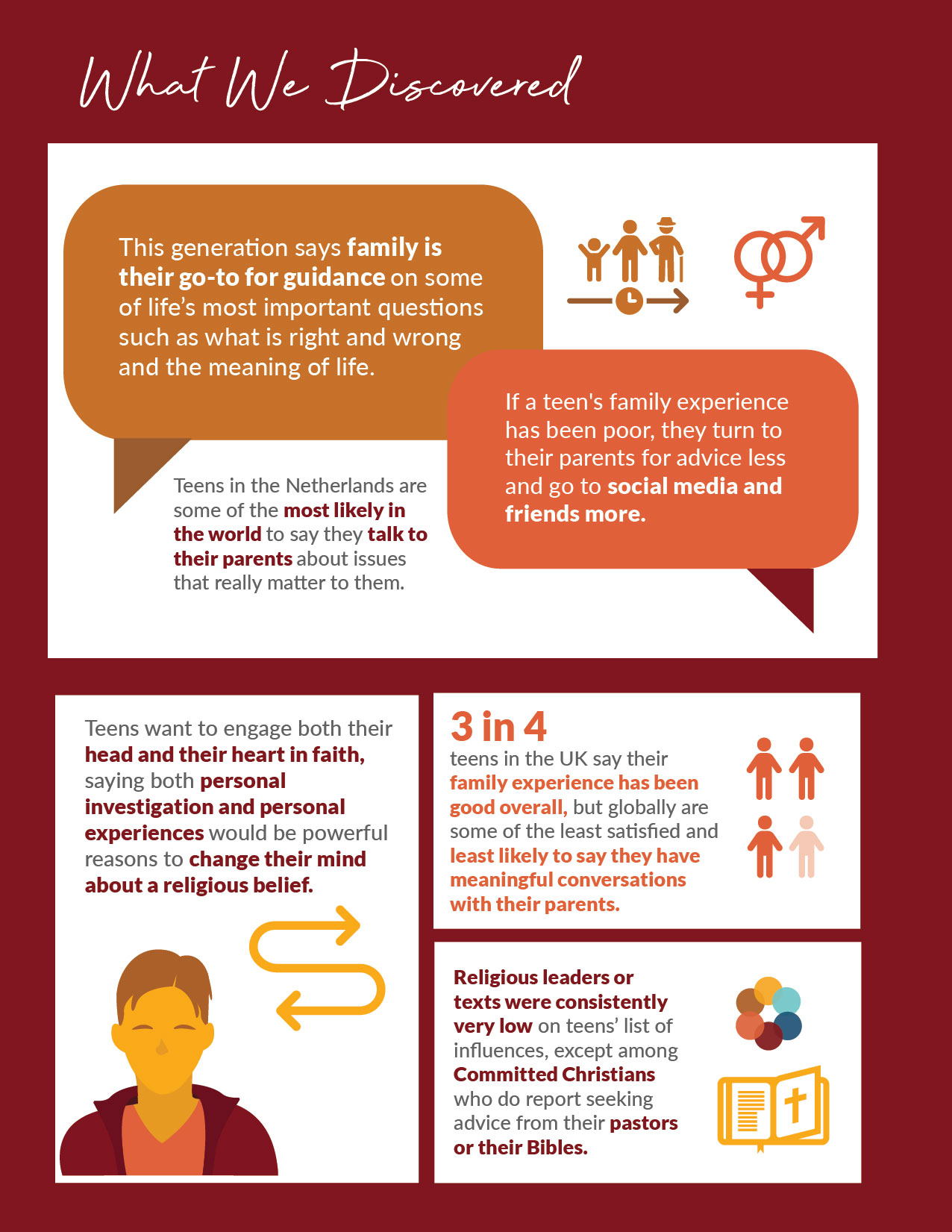
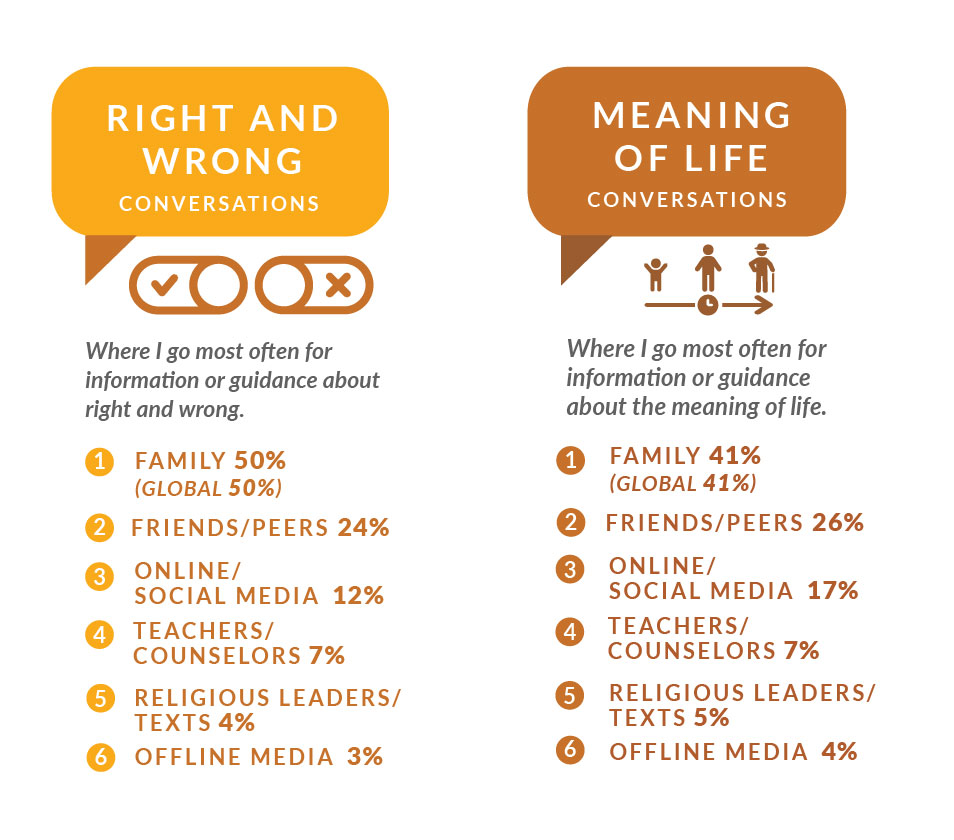
The Dutchwoman Jo Haaijer has been involved in leadership roles in the business world, NGO’s, ministry organizations and churches. She has been married to her husband Martijn for 30 years and has adult children who are serving the Lord. Martijn and Jo are serving churches in The Netherlands with leadership development and teambuilding.
Since 2014 Jo Haaijer has served Onehope, first as National Coordinator and later in the role of European director. Onehope is a global ministry reaching children and youth with God's Word. We are sharing God’s word with children during a time of uncertainty and strategically equipping churches to share Scripture in new ways. These could be print, digital, film and even church planting.
Recently, Onehope brought out a global study on Youth Culture, covering the trends and behaviours of today’s teenagers, the most connected generation. More than 8,300 teens from 20 countries completed an online survey for the Global Youth Culture project.
Jo works with partners throughout Europe to reach children and youth with a relevant Gospel message.
Jo also serves in the Lausanne Europe Process Team and is a board member for the Wycliffe Global Alliance.

